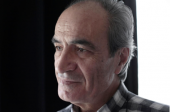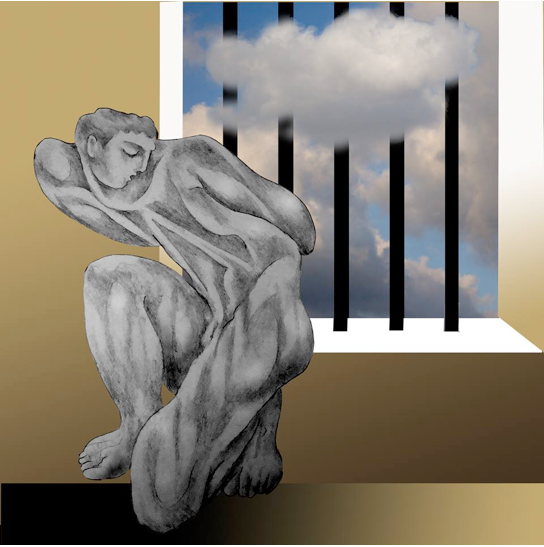The Soap Man by Najati Tayara
by Najati Tayara translated by Ethan Pullman / July 27, 2016 / No comments
I did not find the bathing soap this morning, and as I looked for another I remembered what happened to me during my days in the third military (Polish) prison, where I was transferred from the basement of the Air Force Intelligence during my second period detention. Then, I extraordinarily managed to gain access to a bar of soap, which I retrieved from my small bag when I was unexpectedly allowed to search for my medicine, which I always kept with me. The prison officer had laughed at me when I asked for permission to carry it along with the medicine, and said, “I advise you not to use the soap in the presence of your cellmates whose number surpasses seventy.” He was absolutely right. Otherwise how would the fist-sized soap be enough if used by the large number of detainees, most of whom had not washed for twenty days or more and who cleaned their hands with dirt deposited between the bars of the prison windows, or with what calcium dust stuck to the newly painted walls or, especially, the broken pieces from the floor seal. While I, on the other hand, had washed my hands and body only eleven days ago!

- Najati Tayara is a leading writer, editor, and human rights activist from Syria who played a large role in the “Damascus Spring.” Prior to the Syrian Revolution, he was the editor-in-chief of Al-Marsad magazine and contributed to Tayyarat magazine; both magazines have since been shut down. His other works include the 1997 book Political Parties and National Arab Movements and the 2001 book A Portrait of a Renaissance Pioneer. In 2011, he was arrested for an interview that he gave to Al-Jazeera TV about the crackdown by Syrian forces on peaceful protestors in Homs. As a result of international pressure, he was released in 2012. Since then he has lived in exile. He continues to contribute to Arabic newspapers and magazines and is working on an upcoming book project. Najat Tayara was the ICORN writer-in-residence of the Paris City of Refuge from 2013-2015.
I took the soap and returned to my cell, then waited until dawn the next day. Most of us were forced to sleep at nine in the evening, under the intense and constant spotlights and the threat of torture as punishment for anyone who did not sleep. We were then forced to wake up at three in the morning to receive a measly breakfast of Syrian bread, served to us like animals, and after which most of us returned to sleep.
I waited until everyone slept or appeared to be sleeping before I went to one of the three washrooms at the edge of the sleeping quarters. I was thrilled to wash that September morning, despite the cold water, which I poured generously, not minding the extravagance, using the famous and popular Homs yogurt company plastic container that could be found all over the inmate quarters. Once I finished, I held the soap and exited the washroom, returned to my cell and sat on my half of the shared blanket, joyful and hopeful. I was thinking of the next recipient of the five-star washroom with soap, when one of my fellow inmates woke up. It was Mahmood, who later chose to use the nickname Arabi. He liked getting arrested frequently (always coming and going, as they say). I knew that, for him, it had been a while longer than me without a shower as a result of being constantly transferred and relocated from one security branch to another. So I whispered to him and gave him the treasured soap, advising him to return it quietly to me alone. I became occupied and many others woke up before I realized that Mahmood had returned without the soap. I asked him about it and he pointed out that he gave it to Esaam. I said to him, “That’s alright, you’ve done well,” but I later noticed that Esaam was outside the washrooms, standing with others at the west window watching the sky and distant trees. I waited patiently for a signal or expression from him – I didn’t understand what had become of the soap – but that did not happen. He remained busy, turning away. Finally, I went and cornered him, whispering, “Feeling fresh?!” as I drew near to smell his shower aroma.
He whispered back, “Sadly no, I didn’t shower.”
Puzzled, I asked “Why not? Mahmood gave you the soap.”
He said, “Yes, I took it, but I am cursed. What can I do?”
I didn’t understand him and asked again, “What happened to the soap?”
He replied, “As soon as I poured water over me, having left the soap in the corner, it slipped and fell down the drain.”
“But reach in and retrieve it! Your hand can easily be washed!” I screamed at him.
He looked as though he was ready to cry and said, “I swear I reached in, my friend, all the way to my elbow, but it was no use. I couldn’t retrieve it. I became dirty and didn’t shower. That’s my luck!”
From that day, I no longer called poor Esaam by anything except a nickname: The Soap Man. This name became popular among us throughout the Polish prison and basement cells where we returned and which did not lack soap! I learned after our release from prison that The Soap Man has become a member of the Syrian diaspora, like many others, who unlike me will not remember much of the incidents in prison. But he will remember each time he holds soap. He will handle it carefully and always keep it in a safe place!





